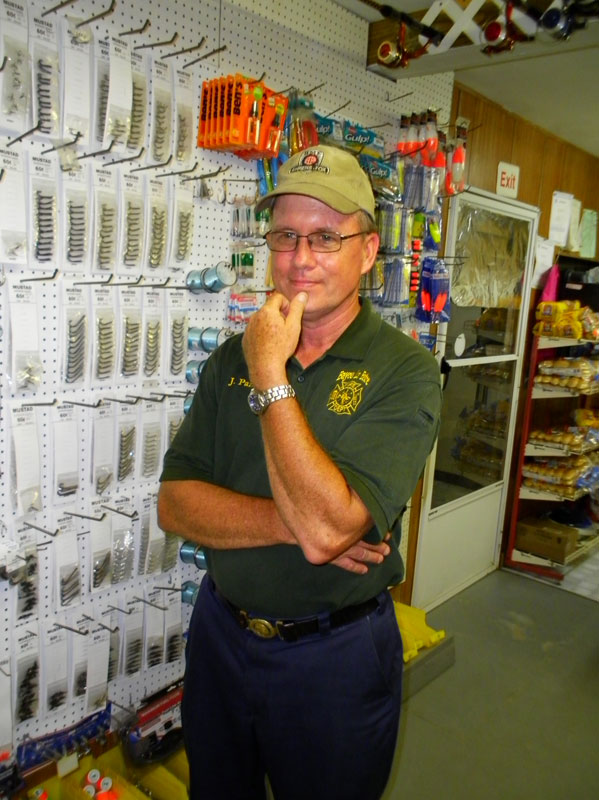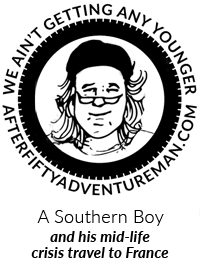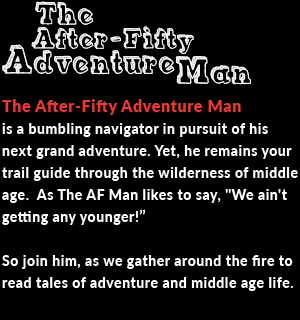June 20, 2010 –
Bayou La Batre, Alabama
AFTER SPENDING THE NIGHT at Trinity Episcopal Church, in Gulf Shores, Alabama—courtesy of Father Chris Coats and his wonderfully engaging assistant, Catherine—Tim and I depart for the 20-mile ride to Fort Morgan, on the east side of Mobile Bay. There, we catch the ferry to Dauphin Island and head on to Bayou La Batre, Alabama. As we near the Bay, we are anxious about the presence of oil on the beaches, and are very relieved when we see none, neither on the ferry ride nor upon landing on the island.
Very present and active, however, are the BP staging areas, which are manned by National Guard personnel, who are in charge of ingress and egress at each station. Since we first saw them at Perdido Pass, in Florida, these staging areas have become commonplace to us. They seem to be dump locations for white plastic bags of oil debris, new and used oil boom storage (long, rectangular floating tubes that are placed at waterway entry points to stop and absorb oil), and feeding locations for cleanup crews. We speak with some of the BP cleanup personnel on Dauphin Island and find out that the oil has not worked its way into the Bay to any serious level. This news bolsters our morale and gives us a more optimistic feeling than the news we’ve been hearing on our way across the Gulf coast.
The Dauphin Island Causeway and Bridge is approximately four miles long. Approaching on bicycle, the bridge crest seems like it’s about 500 feet of vertical rise. As you get nearer, however, the incline reformats itself into a more manageable view. There is definitely an optical illusion at work—Tim and I have both commented on this fact, after previous bridge-climb experiences. At the top of the bridge span, we encounter a commanding, 360-degree view of Mobile Bay. Below us, a web of oil booms crisscrosses the delicate network of creeks and protects the expanse of sandbar beach. I think how incongruous this clunky, man-made system seems and wonder if its function is to simply make everyone feel that help for the Bay is at hand. Close by, a large stingray silently works its way along the bottom, searching for its next meal; a school of bait mullet swims near an oyster bed; and from the north, running parallel to the causeway, a flock of pelicans skim the rippling water of the Bay. On any other day, these sights would be simple, sweet vignettes of life in the Gulf, but today as we skirt the front edge of a looming bloom of oil, I say a quiet prayer for all life inhabiting this delicate ecosystem.
A few hours later, we ride into Bayou LaBatre, home to much of the shrimping industry in the Bay. Tim has been concerned, on our way in, that we might be passing up opportunities for our night’s lodging. We have, in fact, passed several churches, but I feel strongly that we need to make contact with the local fire department. Soon, we find the department, doors up, one empty garage bay awaiting the return of one of their three fire engines. We agree to wait it out and trust in the hope of a providential outcome. About twenty minutes later, the bright red truck pulls to a halt before us, and the driver backs in before the empty stall. As the driver steps down from his high perch behind the wheel, I know we have found a friend.
Jimmy Paine is the Assistant Chief of the department. After we answer his many questions about our trip and our plans for the night, Jimmy directs us to a location beside the building where he says we can pitch our tents. He makes us the offer of a hot shower inside, and we are exceedingly grateful for his hospitality. Jimmy goes about his duties, washing his fire engine. He tells me she is his “baby,” and it is clear Jimmy extends the brilliant red engine elegant care. All her chrome shines, and her paint glistens in that luxurious way only a hand wax can accomplish. If fire engines could communicate, Jimmy’s Baby is one very satisfied machine.
Jimmy watches us closely for a while, sizing us up. And when Tim goes inside for a shower, I strike up a conversation about his town, the oil spill, St. Augustine, and his life as a fireman. I learn that Jimmy’s family was French and had settled in Bayou La Batre in the mid-1700s. I also learn that he and his crew are pulling long shifts because of the spill, providing support for the BP staging area. There seems to be a moment when Jimmy considers his words more deliberately, and his gaze becomes more intense. He pauses for a long moment, and if I weren’t paying close attention, I might have missed the wetness around his soft eyes.
Jimmy then proceeds to tell me that he and his crew have been told more than is being reported in the news. His status update takes my breath away. Apparently, the small town of Bayou La Batre has been given a million dollars for new hazmat equipment. The department is heavily engaged in training, and the expectation is that, within one year, the bay will be a dead zone, bereft of any shrimp, oysters, or any of the fish that have earned Bayou La Batre its rightful place as the center of the Gulf shrimping industry.
The department, he continues, is preparing for many oil-related illnesses, and has been told that it could possibly be twenty to thirty years before the area produces seafood again. I can’t believe what I’m hearing. A deep pain shoots through me, as the full force of Jimmy’s words settles into my being. I am completely stunned, and my face must show it. Jimmy gives me a few moments, as he looks off towards a distant place that I suspect is located beyond the docked shrimp boats before us, somewhere out on the river, as it approaches the mouth to the Bay.
Jimmy says the only thing he can do under these critical circumstances is perform his job. The spill is out of his hands, but he will be here to do his best for the good people of Bayou La Batre. Jimmy Paine is a guardian to his land. He and his ancestors have made their way and lived from the harvest of Mobile Bay for the past 250 years. I can only attempt to understand how this man must feel, as he watches the oil move closer to his home.
Later, Jimmy directs me to a local restaurant for fried chicken, apologizing that the fish and oyster houses are all closed. I ride the Surly through town to fetch our chicken dinner, which we eat on the picnic table in front of the firehouse. As Tim and I are completing our meal, Jimmy reappears with a grin. “Hey, you boys want to take a ride in the fire truck down the bayou?” he asks. “Hell, yes!” Tim and I answer. Five minutes later, we are heading down the bayou road as the sun sets along the river. Tim and I ride in the back, where the firemen are usually buckled with heavy coats, axes, and fire masks. We look at one another with big, toothy smiles, amazed at our incredible luck. Tim shouts over the roar of Jimmy’s Baby, “This trip just gets better everyday!” I settle back in my seat, taking in the view. We pass fish houses, boat yards, and group after group—literally hundreds—of docked shrimp boats.
A few miles up the road, Jimmy comes to a stop, and we follow him across the dark parking lot to a small store at a marina. Inside, we meet Russell, the owner of the marina, and Pearl. Before them is a huge cardboard box of fresh, steamed crawfish. For Tim and me it seems as if we’ve entered heaven, but I wonder if everyone else inside feels they’re awaiting passage across the river Hades straight into Hell. As we make introductions, Jimmy hands us each a beer and asks if we’ve ever eaten such tasty red crustaceans. Tim sucks heads and busts tails in his first ever crawfish experience—and we all listen to talk of the spill.
Russell tells of having to close his oyster business in mid-May and steadily laying off forty employees, until it is just he and Pearl left to run the marina. On a big, flat screen TV, CNN runs a clip of a BP protest filmed in Russell’s parking lot earlier in the day. The synchronicity of these overlapping moments is hard to ignore. Looking out the screen door, Russell wonders aloud what will happen to them all. His quiet lament seems to be the new mantra for an entire region, certainly for all of the people in Bayou La Batre. No one in the room has an answer for Russell. It is an awkward moment to endure.
Outside, we meet Brandy, Jimmy’s daughter and the night watchman at the BP staging area located on the other side of the marina parking lot. We stand in the warm night and listen to Jimmy explain about the crew boats and all the efforts underway. I thank him for being such a gracious host, and he says, in a trailing voice, “I just wanted somebody to see this.” He starts to say something else, muttering to himself about where it is all heading, but stops short and motions us back to the fire engine. He continues to point out sights on our way back to town, and when we return, it is approaching 11:30. Jimmy has to be tired, but we sit and talk until midnight, when the relief chief shows, when Jimmy, who is worried about us sleeping in the heat and humidity, gets the okay for us to sleep in the firehouse.
The next morning, I see Jimmy briefly as I prepare my bike for departure. His day is in full swing, and the closeness we shared last evening is not possible. We shake hands, and I thank him for his extreme generosity. He looks at me with sad eyes, and I know I am witnessing a man with an important job to do. The people of Bayou La Batre are in his care. I know he will do his best by them. I have my hand in Jimmy’s for a long moment, and I feel as if he is giving me something. Then he says, “I don’t know you guys or what your connections are but.…” And then his words trail off into nothing. Jimmy gives me a last farewell, hops in his truck, and backs out of the parking lot.
I watch as Jimmy drives down the bayou road and disappears around a curve. I can’t escape the feeling that Jimmy Paine called me there to witness the tragedy underway in Bayou La Batre. I feel helpless in view of what I have seen, of the news Jimmy has shared. Though my home is St. Augustine, Florida, I have always felt the low country of the Gulf Coast is the center that holds our region together. Life emanates from the shallow waters and marsh grasslands that envelop our coast. Jimmy’s people knew this. They have stood watch over the coastal circle of life for the past 250 years. His generosity is such a beautiful example of Southern hospitality—but there is more to it than that: Jimmy Paine is attempting to extend the circle because he knows he and his kind can no longer ensure its survival alone.












Leave a reply